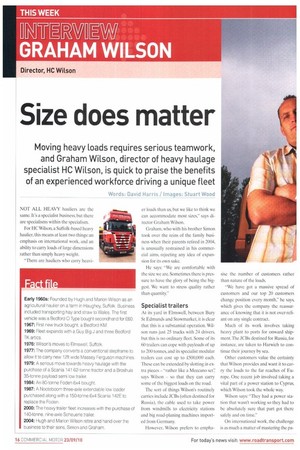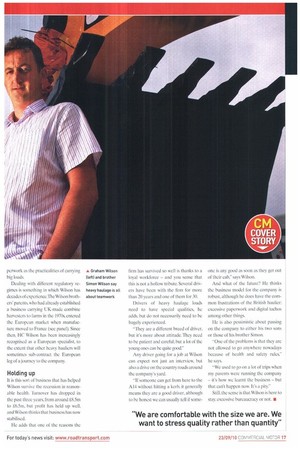Size does matter
Page 16

Page 17

If you've noticed an error in this article please click here to report it so we can fix it.
Moving heavy loads requires serious teamwork, and Graham Wilson, director of heavy haulage specialist HC Wilson, is quick to praise the benefits of an experienced workforce driving a unique fleet
Words: David Harris / Images: Stuart Wood
NOT ALL HEAVY hauliers are the same. It's a specialist business, but there are specialisms within the specialism.
For HC Wilson, a Suffolk-based heavy haulier, this means at least two things: an emphasis on international work, and an ability to carry loads of large dimensions rather than simply heavy weight.
"There are hauliers who carry heavi er loads than us, hut we like to think we can accommodate most sizes," says director Graham Wilson.
Graham, who with his brother Simon took over the reins of the family business when their parents retired in 2004. is unusually restrained in his commercial aims, rejecting any idea of expansion for its own sake.
He says: "We are comfortable with the size we are. Sometimes there is pressure to have the glory of being the biggest. We want to stress quality rather than quantity."
Specialist trailers
At its yard in Elmswell, between Bury St Edmunds and Stowmarket, it is clear that this is a substantial operation. Wilson runs just 25 trucks with 24 drivers, but this is no ordinary fleet. Some of its 60 trailers can cope with payloads of up to 200 tonnes, and its specialist modular trailers can cost up to £500,000 each. These can be extended by slotting in extra pieces "rather like a Meccano set": says Wilson so that they can carry some of the bigzest loads on the road.
The sort of things Wilson's routinely carries include JCBs (often destined for Russia), the cable used to take power from windmills to electricity stations and big road-planing machines imported from Germany.
However, Wilson prefers to empha sise the number of customers rather than nature of the loads "We have got a massive spread of customers and our top 20 customers change position every month," he says, which gives the company the reassurance of knowing that it is not over-reliant on any single contract.
Much of its work involves taking heavy plant to ports for onward shipment.The JCF3s destined for Russia, for instance, are taken to Harwich to continue their journey by sea.
Other customers value the certainty that Wilson provides and want it to carry the loads to the far reaches of Europe. One recent job involved taking a vital part of a power station to Cyprus, which Wilson took the whole way.
Wilson says: "They had a power station that wasn't working so they had to be absolutely sure that part got there safely and on time."
On international work, the challenge is as much a matter of mastering the pa perwork as the practicalities of carrying big loads.
Dealing with different regulatory regimes is something in which Wilson has decades of experience.The Wilson brothers parents, who had already established a business carrying UK-made combine harvesters to farms in the 1970s, entered the European market when manufacture moved to France (see panel). Since then, HC Wilson has been increasingly recognised as a European specialist, to the extent that other heavy hauliers will sometimes sub-contract the European leg of a journey to the company.
Holding up
It is this sort of business that has helped Wilson survive the recession in reasonable health. Turnover has dropped in the past three years, from around £8.5m to £6.5m, but profit has held up well. and Wilson thinks that business has now stabilised.
He adds that one of the reasons the firm has survived so well is thanks to a loyal workforce — and you sense that this is not a hollow tribute. Several drivers have been with the firm for more than 20 years and one of them for 30.
Drivers of heavy haulage loads need to have special qualities, he adds, but do not necessarily need to be hugely experienced.
"They are a different breed of driver, but it's more about attitude. They need to be patient and careful, but a lot of the young ones can be quite good."
Any driver going for a job at Wilson can expect not just an interview, but also a drive on the country roads around the company's yard.
"If someone can get from here to the A14 without hitting a kerb, it generally means they are a good driver, although to be honest we can usually tell if some
one is any good as soon as they get out of their cab," says Wilson.
And what of the future? He thinks the business model for the company is robust, although he does have the common frustrations of the British haulier: excessive paperwork and digital tachos among other things.
He is also pessimistic about passing on the company to either his two sons or those of his brother Simon.
"One of the problems is that they are not allowed to go anywhere nowadays because of health and safety rules," he says.
"We used to go on a lot of trips when my parents were running the company — its how we learnt the business — but that can't happen now. It's a pity."
Still. the sense is that Wilson is here to stay. excessive bureaucracy or not. •
































































































































